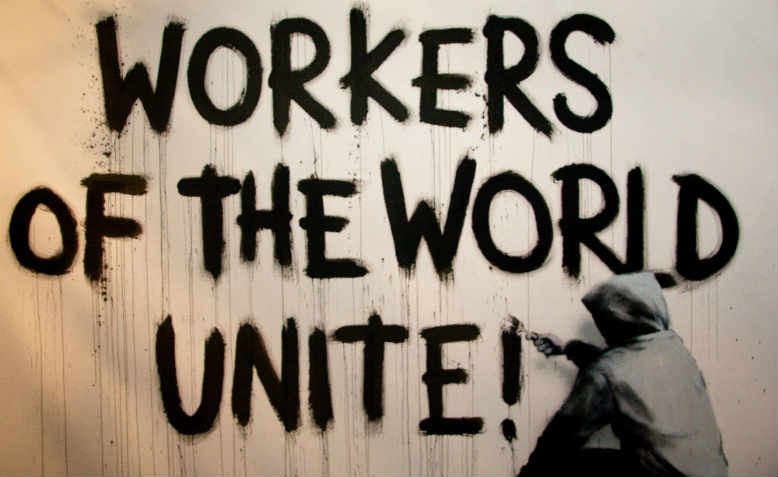 Workers of the world unite! Graphic: Flickr/Jurriaan Persyn
Workers of the world unite! Graphic: Flickr/Jurriaan Persyn
Lindsey German considers results and prospects
Everyone agrees that this is the most important election for decades. We should think about what that means for today and Friday, but also what it means in the longer term. We have today to get out as many people as possible, convincing them to vote Labour even at the last minute and providing them with the confidence and hope to overcome their fears and doubts about a government led by a genuine socialist who has spent his life campaigning for change.
There is also huge division in terms of what is on offer from the two main parties. Labour has a radical programme of nationalisation, building council houses, stopping the sell-off of the NHS, free university education and social care. The Tories, despite their pretensions of being ‘one nation’ and caring about the NHS, will continue with austerity in many areas and will be a right wing, authoritarian government increasingly looking to and mimicking their friends in the Trump administration in Washington.
They have had a remarkably easy ride for a government which has already been in power for nearly a decade and which has presided over worsening inequality, cuts in living standards, and a decay in the social fabric of society. That shouldn’t surprise us given the fear of a Corbyn government which stretches from the studios of New Broadcasting House to the City boardrooms.
But whatever happens in this election, Britain is a crisis-ridden country and the Tories have no answer to this crisis. Brexit symbolises this: Johnson promises a glorious future following his aim to ‘get Brexit done’ but in reality, Britain can no longer rely on its heritage of empire to allow it to posture as a major power. Its prospects economically are bleak, with stagnation over the past months and with historic problems of lack of investment in industry and low productivity if anything getting worse.
The boasts about full employment hides the nature of many of these jobs, and the fact that they are often held by older women who can’t afford to give up work, students penalised by debt or disabled people forced off benefits, tells us exactly the state of Britain today.
Labour’s programme on its own wouldn’t solve these problems but it points to an alternative of serious public investment, improvements in infrastructure and education, and the creation of decent green jobs which can help transform the economy and people’s lives.
Slurs
The major barriers to Labour getting a majority today, it seems to me, lie not in any real confidence in the Tories and certainly not in Boris Johnson, who has become – if this is possible – even less impressive the more we see of him. Instead, people lack confidence that they can change or that society can change, and therefore they fear that a Corbyn government will not deliver, and sometimes believe the slurs against him.
If we look at the feeling of betrayal around Brexit, for example, it lies in the fact that people voted in large numbers to leave the EU, and many politicians now want to set that vote aside. Boris Johnson’s only card is his promise to get Brexit done. Labour’s policy on a second referendum, and its branding as a Remain party, is obviously doing it damage in particularly some Midlands and northern seats.
The immediate issue is to get Labour’s vote out and to make it clear that a vote for the Tories is one that most working people will very soon regret.
But Labour cannot stop there if it wants to build a base for real change. It has to organise in the areas where its support has declined. It has to be part of fighting to win higher wages, trade union rights, better housing, and an NHS which works.
Expectancy
Labour’s membership is concentrated in London and the south east, and its support higher among younger people than older. But there is nothing inevitable about this – indeed Labour needs to recruit young (and older) people in Hull and Carlisle, and it needs to set up organisation outside the big cities which can help counter the media lies.
This means approaching this not as a culture war but as a class war. The same issues face working people everywhere, and there is no more justification for dividing them on the basis of their beliefs and lifestyle than there is of dividing people on the basis of race or nationality. It is at best narrow and dismissive and at worst elitist.
Labour has a huge job of work to do if it manages to get into government because Britain is a really broken country. Public services don’t work, there are huge levels of discontent, and inequality and life expectancy are getting worse. This means undoing not just the legacy of Thatcherism but Blairism as well.
Let’s hope today we can begin that transformation. There is an army of people trying to bring about change. Good luck to everyone today. Whatever happens, we have a world to win.

